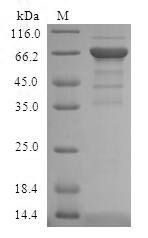Insertion of the gene encoding the Human ADH4 protein (1-380aa) into a plasmid vector results in the formation of recombinant plasmid, which is then introduced into e.coli cells. Positive e.coli cells are selected relying on their ability to survive in the presence of a specific antibiotic. The e.coli cells containing the recombinant plasmid are cultured under conditions conducive to the expression of the gene of interest. A N-terminal GST tag is attached to the protein. Following expression, the recombinant Human ADH4 protein is isolated and purified from the cell lysate through affinity purification. The resultant recombinant Human ADH4 protein is analyzed using denaturing SDS-PAGE, revealing a purity greater than 90%.






